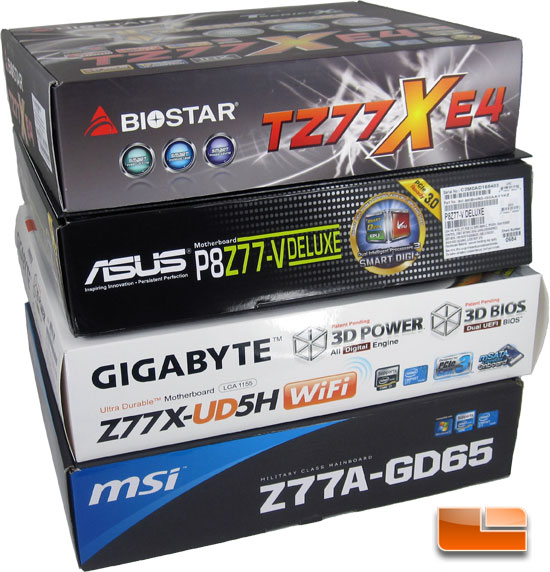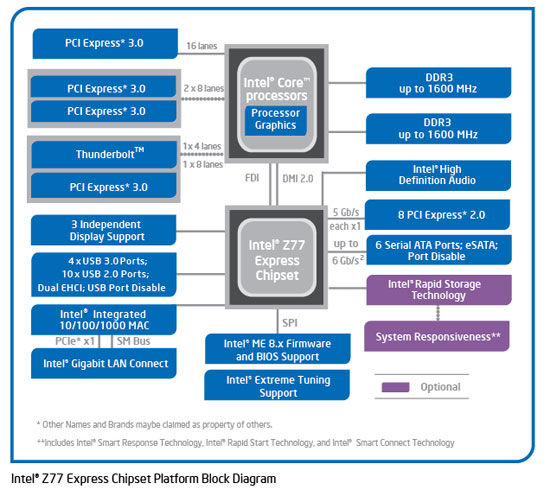ASUS, BIOSTAR, GIGABYTE, and MSI Intel Z77 Motherboard Round Up
Intel Z77 Motherboard Roundup

In the beginning of March when we started looking at Intel Z77 motherboards, we started with the MSI Z77A-GD65 Intel Z77 motherboard. During this preview we ran our full in-depth testing suite and compared it to the ASUS P8Z68-V Pro Intel Z68 platform. In all honesty, we did cause a few ripples in the water with our preview since we were more than a month away from the official Intel Z77 chipset launch on April 8th, 2012. While we don’t typically break NDA’s (Non-Disclosure Agreements) we were given the go ahead from MSI to do a preview article on the Z77A-GD65 with performance numbers from an Intel Sandy Bridge processor. Since then, several other sites have gone live with performance numbers that feature Intel’s ‘Ivy Bridge’ processors. The drawback to the preview was that we were limited to using our Intel Core i7 2600K Sandy Bridge processor. While the 2600K is one great processor, it’s not the processor that the Intel Z77 chipset is meant for. Don’t get me wrong, it’s completely compatible with the Intel Z77 chipset and we have run the 2600K on three various Intel Z77 motherboards. It’s simply that one of the highlights of the Intel Z77 chipset is the support for the new Intel ‘Ivy Bridge’ 22nm processors.
Once the dust settled we were able to get back into the groove and start preparing for the official Intel Z77 launch on April 8th. For the Intel Z77 launch we grabbed a pair of GIGABYTE Intel Z77 motherboards. The first GIGABYTE Motherboard that we got our hands on was the GIGABYTE Z77X-UD5H WiFi, the second was the Z77X-UD3H. Both of the GIGABYTE Z77 motherboards turned out to be great boards with the 2600K. Unfortunately, we were still limited to using the Intel Core i7 2600K on the GIGABYTE Intel Z77 motherboards.
Today, we are able to retire our Intel Core i7 2600K processor from our motherboard test bench! Intel has officially launched the Intel 22nm ‘Ivy Bridge’ series of processors! Nate will be taking an in-depth look at the Intel Core i7 3770K 22nm processor architecture and performance which you can find here. We will be looking at the performance of four different Intel Z77 motherboards with an Intel Core i7 3770K 22nm ‘Ivy Bridge’ processor!

Aside from the 22nm processor support for Intel ‘Ivy Bridge’ processors there are a couple of other significant features with the Intel Z77 Express chipset. Much of the hype about the Intel Z77 chipset has to do with the integration of Intel’s own SuperSpeed USB 3.0 into the chipset. When the Intel Z77 chipset is coupled with one of the new Intel ‘Ivy Bridge’ processors the PCIe x16 slots will be capable of running PCIe Gen 3 cards at full bandwidth. Previously PCIe Gen3 cards would run at PCIe Gen2 speeds. An addition to the Z77 chipset is the ability to run three graphics cards, albeit in an x8,x4,x4 configuration. The Intel Z68 and P67 chipsets were only capable of running two cards in an x8,x8 configuration. Both chipsets have the ability to run a single graphics card at x16, or dual cards at x8,x8. The natively supported memory speed has also been increased on the Intel Ivy Bridge platform. The initial Intel LGA1155 socket chipsets like the P67 and Z68 supported memory at 1333MHz, Ivy Bridge will support memory at 1600MHz natively! This hasn’t exactly been an issue since all of the motherboards that we have come across since the initial iteration of the LGA1155 chipset have featured memory multipliers that allowed us to increase the speed of our memory. While the speed of the supported memory has been increased, the Intel Ivy Bridge platforms will still only support dual channel memory architecture.
Now that we have taken a look at the Intel Z77 chipset we can start looking at the motherboards of the day! The first Intel Z77 chipset motherboard that we are going to look at today is the ASUS P8Z77-V Deluxe. We will follow that up with another new board from BIOSTAR, the TZ77XE4 Intel Z77 motherboard. We are also going to take a look back at the GIGABYTE Z77X-UD5H WiFi and the MSI Z77A-GD65.
Each of the Intel motherboards that we are going to look at today is the top dog in its respective product line. Many of the companies also have their enthusiast product lines as well. GIGABYTE has the G1 series, ASUS has the Republic of Gamers, and MSI has the XPower. So today we are taking the top main stream boards from these companies and comparing the performance. It should also be noted that there is more than $120.00 separating the price points of the boards:
- BIOSTAR TZ77XE4 – $149.99 + Shipping
- MSI Z77A-GD65 – $169.99 w/free shipping
- GIGABYTE Z77X-UD5H – $216.61 + shipping
- ASUS P8Z77-V Deluxe – $274.99 w/free shipping
With that much of a price difference it’s going to be interesting to see if a lower cost motherboard like the BIOSTAR TZ77XE4 is going to be able to keep up with the ASUS P8Z77-V Deluxe that is nearly double the cost! So enough with the chatter; let’s move on to the ASUS P8X77-V Deluxe!

Comments are closed.